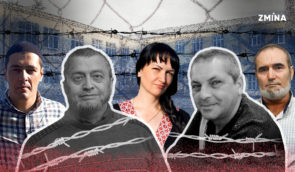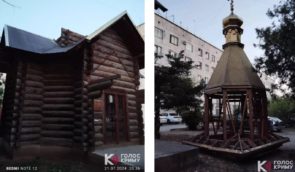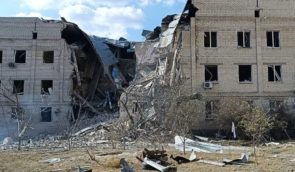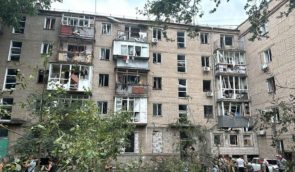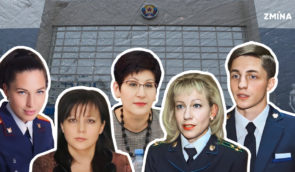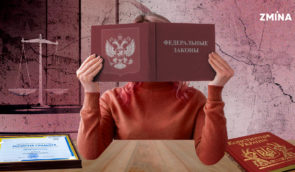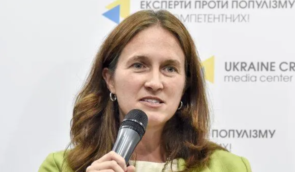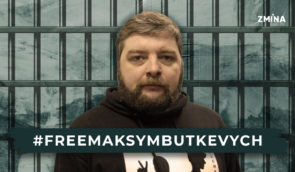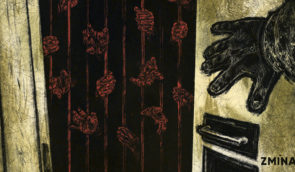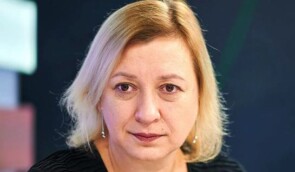A decade of repressions: Crimean Tatars and Ukrainains targeted in Russia’s brutal crackdown on dissent
Crimean residents who did not and do not comply with Russian occupying authorities frequently faced repressive acts, including intimidation, invasive house searches, arbitrary arrest, detention, torture or ill-treatment, enforced disappearance, judicial harassment, instilling generalised fear and stifling expression of any opposition.
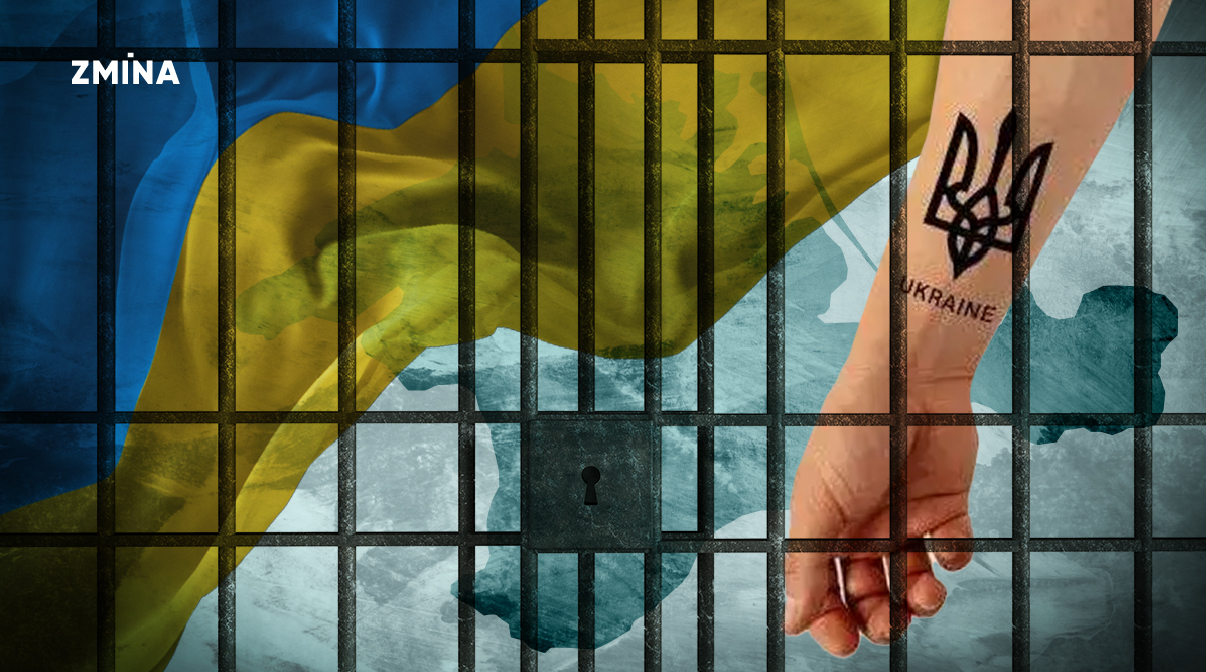
According to the UN report “Ten years of occupation by the Russian Federation: Human rights in the Autonomous Republic of Crimea and the city of Sevastotpol, Ukraine”, Russian authorities especially targeted persons perceived as opposing the occupation, including bloggers, journalists, supporters of the Tatar Mejlis, pro-Ukrainian and Maidan activists, as well as people who advocated for strict compliance with the tenets of Islam.
Russia also persecuted individuals opposed to the full-scale armed attack on Ukraine by the Russian Federation. Since 2014, the United Nations Human Rights Monitoring Mission in Ukraine (HRMMU) has documented 104 enforced disappearancesі 95 men and 9 women of pro-Ukrainian activists, affiliates of Crimean Tatar institutions, and journalists in Crimea.
As of 26 February 2024, 44 had been released after being abducted or arbitrarily detained, 37 were held in custody, 21 were still missing, and two were found dead.
“None of the victims or their families have been provided with any form of redress. Despite reports filed by lawyers and relatives with law enforcement agencies and appeals to the occupying authorities, HRMMU has found no credible information indicating that the authorities of the Russian Federation had opened investigations into the disappearances,” the authors of the report stated.
Amnesty International stated that with international crimes, Russia has attempted to change the ethnic makeup of Crimea while suppressing non-Russian identities on the peninsula, including through restricting education in Ukrainian and Crimean Tatar languages, attacking religious minorities, stifling media and culture, as well as undermining representative institutions and abusing the criminal justice system.
Since 2014, OHCHR has documented 55 cases of torture or ill-treatment allegedly carried out by officers of the FSB in Crimea against individuals in their custody.
According to the UN, occupying authorities in Crimea used torture and ill-treatment against persons charged with extremism, affiliation with groups banned in the Russian Federation, sabotage, or ‘anti-Russian’ activities. Russians subjected victims, mainly men, to mock executions, beatings, electric shocks, and sexual violence to coerce them to confess their alleged engagement in unlawful activities or to elicit incriminating information about others.
Over the last ten years, Amnesty International has highlighted the cases of many individuals who have been punished for exercising their human rights. These cases include leaders of the Crimean Tatar community, civil and human rights activists, bloggers and journalists, such as Akhtem Chiygoz, Emir-Usein Kuku, Server Mustafaev, Nariman Dzhelyal, Irina Danilovich, Mykola Semena and numerous others.
According to the Mission of the President of Ukraine in the Autonomous Republic of Crimea, as of March 18, 2024, Russia is holding 217 Crimean political prisoners, 134 of whom are Crimean Tatars.
 On the photo: the First Deputy Chairman of the Mejlis of the Crimean Tatar People Nariman Dzhelyal, civic journalist from the city of Feodosia Iryna Danylovych, Radio Liberty journalist Vladyslav Yesypenko, human rights defender Server Mustafayev, a Crimean painter Bohdan Ziza
On the photo: the First Deputy Chairman of the Mejlis of the Crimean Tatar People Nariman Dzhelyal, civic journalist from the city of Feodosia Iryna Danylovych, Radio Liberty journalist Vladyslav Yesypenko, human rights defender Server Mustafayev, a Crimean painter Bohdan ZizaHRMMU added that when victims reported torture or ill-treatment to Russian Federation law enforcement agencies or courts, investigations were usually initiated in the form of “inquiries”. In some cases, medical personnel refused to document the victims’ injuries, which further undermined the investigations.
HRMMU refers to the conclusion of the European Court of Human Rights which has found that similar “pre-investigation inquiries” conducted in the Russian Federation fell short of what is required for an effective remedy.
Amnesty International called on the Russian Federation to immediately release all those detained and convicted under unfounded, politically motivated charges, as well as to conduct full and transparent investigations into all cases of killings and enforced disappearances that have occurred in Crimea since the illegal annexation.
Additionally, as of 15 February 2024, HRMMU had documented seven criminal prosecutionsі All against men. and 583administrative prosecutionsі Against 359 men and 224 women. for the offences of “public actions directed at discrediting” and “obstructing” Russian armed forces. An overwhelming majority resulted in convictions.
HRMMU pointed out that Crimean residents were convicted for opinions shared in private conversations or for simply mentioning the Russian Federation’s “attack”, “aggression”, or occupation of Crimea. Social media posts, comments or “no war” hashtags also formed the basis for prosecution.
In March 2023, for example, Russian authorities prosecuted a woman for “discrediting the Russian armed forces” after she uploaded a video to social media where she wore a vyshyvanka, a traditional Ukrainian embroidered shirt, and nail polish in the colours of the Ukrainian flag.
In the early stages of the occupation, Russian Federation authorities placed stringent restrictions on manifestations of, among other things, the Crimean Tatar identity; in particular, prominent community leaders and organisations came under the scrutiny of law enforcement authorities. The restrictions have reportedly been closely connected to the suppression of political dissent and alternative political opinion.
The Mejlis of Crimean Tatar People remains banned in Crimea, and its estimated 2,500 members face the risk of criminal prosecution for belonging to an alleged extremist organization.
On January 31, 2024, the International Court of Justice ruled on a case brought by Ukraine in 2017 concerning the Mejlis ban. The Court found that Russia violated its 2017 order by maintaining the ban, which restricted the Crimean Tatars’ ability to preserve their representative institutions.
HRMMU also notified that prominent persons from the Crimean Tatar community, including Mustafa Dzhemilev and Refat Chubarov, the former and current leaders of the Mejlis, were issued entry bans, preventing them from going to their homeland.
“The broader impact of imposing entry bans on them can be further contextually understood in light of the historical deportation of the Crimean Tatar community from the peninsula in May 1944 and the decades which elapsed before they were allowed to return. Both men subsequently faced prosecution in Crimea and were sentenced to imprisonment following in absentia trials,” HRMMU concludes.
In the other report the UN Office of the High Commissioner for Human Rights concluded that Russia has instilled a pervasive atmosphere of fear in the occupied regions of Ukraine, perpetrating egregious violations of international humanitarian and human rights laws in an attempt to cement its control.
By way of background, on 18 March 2014, Russia illegally annexed Crimea following the military occupation and political takeover of the peninsula. Ukrainian authorities do not recognise the annexation and call Russia’s doing “an attempt of annexation”.
Russia began its military operation to seize the Crimean peninsula from Sevastopol. On February 20, 2014, during a visit to Crimea by Russian presidential aide Vladislav Surkov, a column of armoured personnel carriers left the Cossack Bay of Sevastopol, where the 810th Marine Brigade of the Russian Black Sea Fleet was based.
Russia claims that it carried out its military operation without “a single drop of blood”. However, in the first days of the Russian aggression, Crimeans protested against the occupiers, taking to the streets for rallies and protests against war and Russian military aggression.
In the weeks prior to the Russian military operation of capturing the Crimean Peninsula, there had been confrontations between supporters of the new Ukrainian government and pro-Russian activists, including a demonstration on February 26, 2014, by two opposing crowds that left two people dead and over 30 injured.
During those days, arbitrary detentions and violent abductions of Ukrainians and Crimean Tatars took place, and Ukrainian citizens were also killed during the Russian military operation. On March 18, 2014, Russian soldiers killed Serhii Kokurin, a military topographer and warrant officer of a Ukrainian military unit in Crimea.
On the opinion of the head of the Mejlis of the Crimean Tatar people, Refat Chubarov, on February 26, 2014, Moscow wanted to create a “glamorous picture” through an extraordinary session of the Crimean parliament, suggesting that the Crimeans were asking to join Russia.
On this very day, Russia failed to implement a “peaceful scenario” of annexing the peninsula through a parliamentary vote, and the following day, Russian military forces operating without insignia took over critical administrative buildings, including the Crimean parliament, which elected a new leader the same day.
The de facto authorities then, in violation of the Constitution of Ukraine, called a “referendum” on Crimea’s accession to the Russian Federation on 16 March, 2014. The results of the “referendum” were recorded as giving an overwhelming majority in favour of accession, and on 18 March, Russia formally completed its annexation of the peninsula.
On 27 March 2014, the United Nations General Assembly overwhelmingly adopted a resolution stating that “the referendum… having no validity, cannot form the basis for any alteration of the status” of Crimea. A second resolution, adopted on 19 December 2016, refers to Crimea as being under the “temporary occupation” of the Russian Federation.
Amnesty International explains that the relevant legal frameworks for assessing Russia’s actions in Crimea are international human rights law (IHRL) and international humanitarian law (IHL), sometimes known as the law of armed conflict. Human rights organisation blamed Russia for it immediately violating its obligations under IHL by fully imposing its own legal system on Ukrainian Crimea.
Since the illegal annexation, international and regional human rights mechanisms have been refused entry to the peninsula by the Russian authorities. Among the first mechanisms to be denied access were the OSCE High Commissioner on National Minorities and the UN Special Rapporteur on Minority Issues.
The UN Human Rights Monitoring Mission in Ukraine, mandated by the General Assembly to assess the human rights situation in the entire territory of Ukraine, including Crimea, has never been allowed access to the peninsula by the occupying authorities.
Earlier, President Volodymyr Zelenskyy noted that Ukraine should continue to increase its resistance to Russia at all possible levels and fight for people in all occupied territories. Ukrainian authorities repeatedly claimed to de-occupy all Ukrainian territories, including the Crimean peninsula.
The human rights community in Ukraine also believes that the de-occupation of Crimea is necessary to stop the systematic violations of human rights committed by the Russian Federation on the peninsula. They are urging other countries to support Ukraine with timely and sufficient weapons and military equipment supplies towards this end.
Ukrainian authorities also have repeatedly called on Russian citizens who have illegally settled in the temporarily occupied Crimea to leave the peninsula while there is still such an opportunity. For Ukrainian citizens on the peninsula, Ukrainian authorities have published detailed instructions on what civilians should do during the hostilities in Crimea and the de-occupation of the peninsula.
Earlier, the human rights NGO Crimea SOS emphasised that ignoring the war crimes of the Russian occupiers has led to a deterioration of the human rights situation in the occupied Crimea. The lack of response from the international community to the occupation of Crimea and the further crimes of the occupiers made it easier for Russia to turn the peninsula into a springboard for the invasion of mainland Ukraine in 2022.
In July 2023, Wayne Jordash, the managing partner of Global Rights Compliance LLP, said that the International Criminal Court is not doing enough to investigate international crimes against civilians in the temporarily occupied Crimea.

